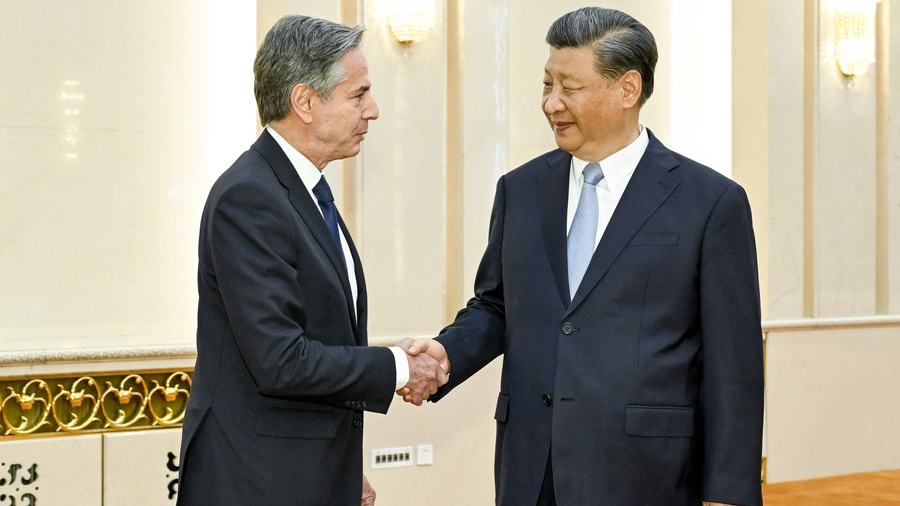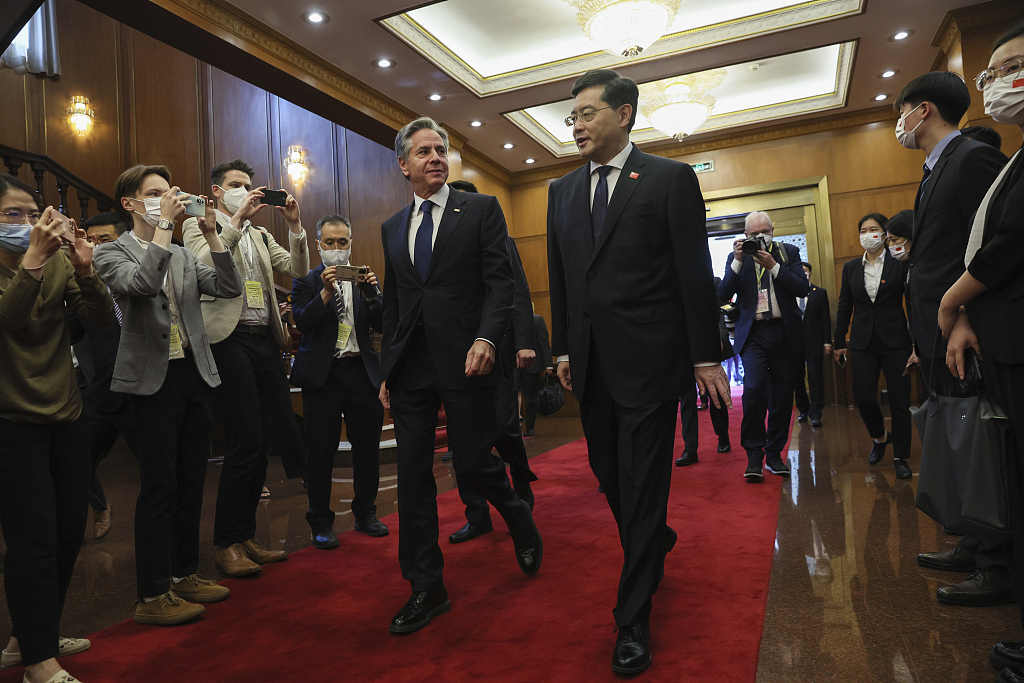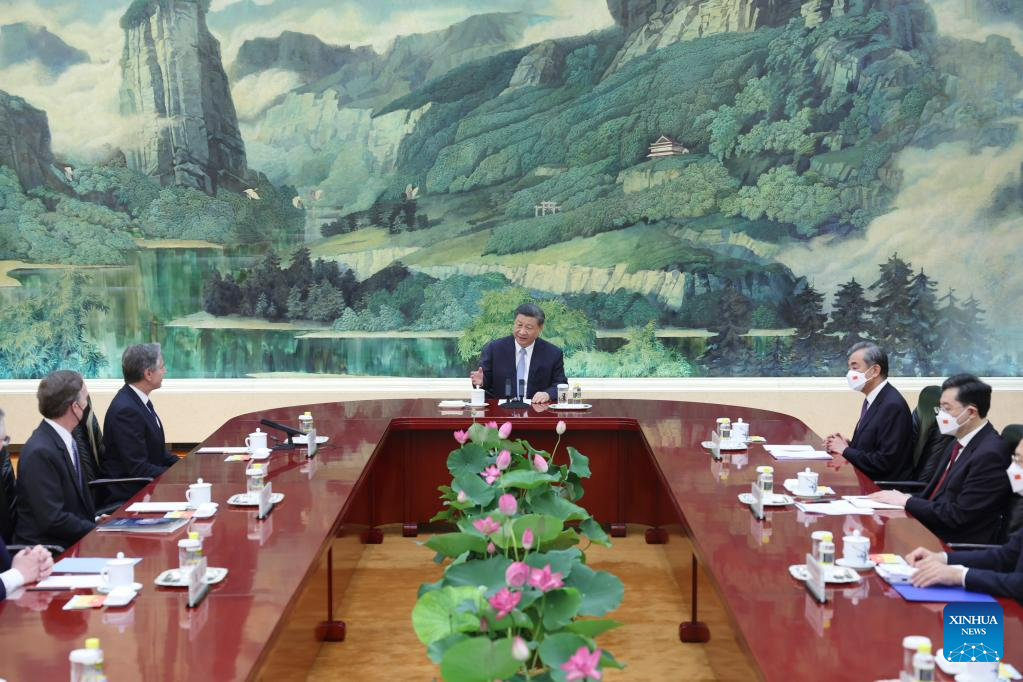
Chinese President Xi Jinping meets with visiting U.S. Secretary of State Antony Blinken in Beijing, capital of China, June 19, 2023. /Xinhua
Chinese President Xi Jinping meets with visiting U.S. Secretary of State Antony Blinken in Beijing, capital of China, June 19, 2023. /Xinhua
Editor's note: William Jones, a special commentator on current affairs for CGTN, is a former White House correspondent for Executive Intelligence Review. The article reflects the author's opinions, and not necessarily those of CGTN.
The U.S. Secretary of State Antony Blinken visited Beijing on June 18-19, the highest-level visit of a Joe Biden administration official to China since Biden took office. The visit carried a good deal of symbolism.
Because of the general thrust of the administration to reassert a dominant role for the U.S. in the Asia-Pacific region, draconian measures have been taken by the U.S. to limit China's access to high-technology products in the markets of the U.S. and its "allies," and it has maintained the sanctions imposed by the Donald Trump administration in its own effort to assert U.S. leadership in the region. Going into the Blinken visit, both sides had clearly noted that the U.S.-China relationship was at the lowest level in years.
Secretary Blinken's visit has raised hopes that there would be some relief to this tense situation. In his six-hour meeting with Chinese State Councilor and Foreign Minister Qin Gang on June 18, which has been characterized as "candid" and "constructive," Blinken reiterated the commitments made by President Biden to President Xi Jinping in Bali, namely, that the U.S. is committed to the one-China principle, it does not seek a "new Cold War," does not support Taiwan independence, and its "alliances" are not aimed against China.

Chinese State Councilor and Foreign Minister Qin Gang meets with visiting U.S. Secretary of State Antony Blinken in Beijing, capital of China, June 18, 2023. /CFP
Chinese State Councilor and Foreign Minister Qin Gang meets with visiting U.S. Secretary of State Antony Blinken in Beijing, capital of China, June 18, 2023. /CFP
In practice, however, the actions of the United States in the region have cast doubt on whether the Biden administration will hold to these commitments.
The Blinken visit seems to have reaffirmed them. The two sides also agreed to maintain high-level contacts and to begin to reinstate educational exchanges and the people-to-people relationship.
In addition to the meeting with Qin, Blinken also met with Wang Yi, director of the Office of the Foreign Affairs Commission of the Communist Party of China Central Committee, on June 19, a meeting in which Wang reiterated the importance of the Taiwan question for China.
This was followed by a meeting with Chinese President Xi Jinping. Observers were waiting on tenterhooks to see if such a meeting would occur, as it would give a clear picture of whether the government viewed the outcome of the Secretary's visit as positive.
In his meeting, Xi underlined that "the two countries should act with a sense of responsibility for history" and "handle China-U.S. relations properly." He also noted importantly that "major-country competition" was not the trend of the times and that it could not solve America's own problems.
Blinken, in turn, conveyed President Biden's greetings to President Xi and reiterated that the United States is committed to returning to the agenda set by the two presidents in Bali. He said that the U.S. was looking forward to having high-level engagement with China, managing differences, and pursuing dialogue, exchanges and cooperation. Xi asked Blinken to convey his regards to President Biden.

Chinese President Xi Jinping meets with visiting U.S. Secretary of State Antony Blinken in Beijing, capital of China, June 19, 2023. /Xinhua
Chinese President Xi Jinping meets with visiting U.S. Secretary of State Antony Blinken in Beijing, capital of China, June 19, 2023. /Xinhua
The Blinken visit also set the stage for a possible meeting between the two presidents, either at a G20 meeting or an Asia-Pacific Economic Cooperation (APEC) meeting, if both presidents are in attendance at either of them. The next G20 Leaders' Summit will be held in New Delhi in September and the APEC Leaders' Meeting 2023 will be held in San Francisco in November. It is unclear whether President Xi will be attending either of these gatherings.
It is also unclear whether the Biden administration can keep to the commitments President Biden has made. The U.S. Congress is pretty much "off the rails" in the issuance of continual anti-China restrictions and this is pretty much a bipartisan affair.
While the world may breathe a sigh of relief that this meeting took place, there will be close attention paid to how this is followed up. The fundamental issue, which still remains, is whether the United States prepared to accept China as a major player on the world stage, or will it continue to attempt to throw up roadblocks to China in its attempt to achieve its modernization? In addition, will it continue to organize its "allies" into "small groups" aimed at containing the growing influence of China?
These questions remain unanswered at the moment, but the Biden administration should take into consideration to the comments made by President Xi to Secretary Blinken: Major-country competition cannot solve America's problems, problems of a burgeoning deficit, decaying infrastructure, and a continual deterioration in the quality of life of Americans. Any "decoupling" or "de-risking" which has the effect of severing the links connecting the U.S. and the Chinese economy can only plunge the country into greater turmoil and cause great suffering throughout the world.
(If you want to contribute and have specific expertise, please contact us at opinions@cgtn.com. Follow @thouse_opinions on Twitter to discover the latest commentaries in the CGTN Opinion Section.)